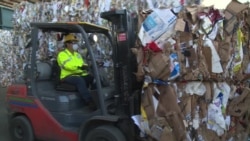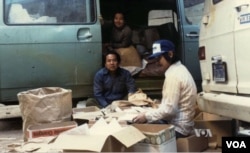David Duong and his family were rescued at sea after fleeing Vietnam in a small boat at the end of the Vietnam war.
“We almost, you know, died in the ocean because the boat engine broke, and then we have to be out there, the boat just floating.”
They lived in a refugee camp before settling in the western state of California. They worked hard, and created a recycling company that is now worth hundreds of millions of dollars.
The company was created because David Duong’s family of 23 needed money. They began gathering cardboard on the street. And they sorted recyclable materials. Duong’s father saved $700 for a partial payment on a used truck. But he needed more money.
“He went to Chinatown to a Chinese church and asked for help. The church people know us and they help(ed) us so we can go around and pick up recyclable material and sell -- and that’s how we started.”
Workers and machines now do the work that Duong’s family once did by hand.
Many trucks leave California Waste Solutions early in the morning to gather materials that can be recycled. They travel to such cities as San Jose and Oakland. The large trucks were manufactured for recycling activities. They cost $300,000 each.
Workers gather thousands of tons of cardboard, aluminum, glass and other materials.
Large machines are used to place the mixed materials into huge piles so the materials can be sorted.
Manufacturers want plastic, aluminum or paper that is not mixed with other materials. They like the process California Waste Solutions uses.
Joel Corona is the company’s chief operating officer. He says the process helps the environment.
“The point for the state of California and for the city of San Jose and the city of Oakland is zero waste -- trying to remove as many recycled materials as possible from the stream that goes to the landfill.”
As President Barack Obama looks to expand trade between the United States and Vietnam with his three-day visit, Doung has this to say:
“An immigrant here, now I be able to bring the technology that we learned, we do it here in the U.S., bring it, you know, back to our hometown and be able to help the people of Vietnam and help the environment, and those are things I’m just so proud (of).”
Duong uses the same process in Vietnam, where his company operates large recycling centers. They are growing. He says the Vietnamese government is making it easier to invest. That could encourage some Vietnamese to end their anger toward the government and start new companies in their former home.
By expanding to Vietnam, Duong is sharing the idea that hard work, risk-taking, good luck and a strong goal can help people become very successful.
I’m Jonathan Evans.
VOA Correspondent Jim Randle reported this story from Oakland, California. Christopher Jones-Cruise adapted it for Learning English. Hai Do was the editor.
We want to hear from you. Write to us in the Comments Section, or visit our Facebook page.
_____________________________________________________________
Words in This Story
broke – v. to stop working because of being damaged
recycle – v. to send (used newspapers, bottles, cans, etc.) to a place where they are made into something new
by hand – expression with the hands
point – n. an idea that you try to make other people accept or understand
stream – n. a continuous flow of people or things (usually + of)
landfill – n. an area where waste is buried under the ground







